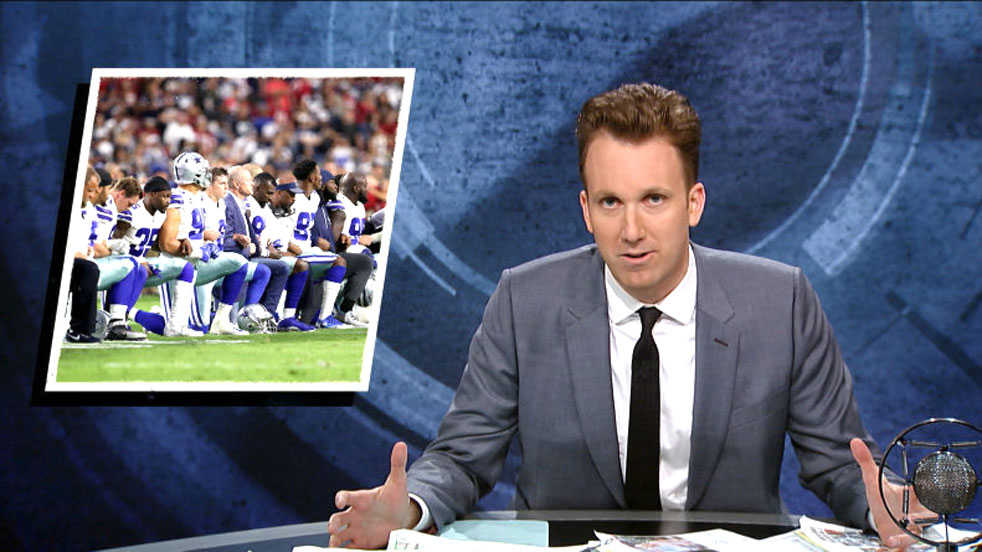In 1999, Jon Stewart took over as the host of “The Daily Show,” kicking off a revolution in the nature and focus of late night television. Before then, shows in the genre focused on pop culture and interviews with celebrities, but Stewart developed a paradigm that centered on political satire.
Soon, the field expanded with the introduction of “The Colbert Report,” a spin off from and the fake political counterpart to “The Daily Show.” Stephen Colbert found success lampooning the conservative talk shows; his nine-year run as host of the show ended only when he left to take over as the host of “The Late Show.”
Since “The Colbert Report” ended in 2014, Comedy Central has lacked a “conservative” satire to counterbalance “The Daily Show.” On Sept. 25, that role was finally filled with the introduction of Jordan Klepper’s show “The Opposition.” While Klepper’s new show satirizes conservative commentary much like “The Colbert Report” did, “The Opposition” is not simply a rehashing of the old series. Since 2014, the political climate of the U.S. has changed drastically, and with it conservative media have undergone a dramatic transformation as well.
In recent years, Americans in the far right have begun turning off their televisions and finding new voices in extreme online podcasts and websites like Alex Jones’s InfoWars and Steve Bannon’s Breitbart News. Many of the most conservative Americans no longer get their news and opinions from Fox News, but rather from a host of fresh sources popping up all over the internet.
“The Opposition” reflects this shift in its format and tone. By claiming to be an independent truth-seeking organization looking out for the American people, the show satirizes these new media. Some diehard Colbert fans may have been hoping that this series would have the same feel as “The Colbert Report” did, but the differences in the two shows are adjustments that needed to be made for Comedy Central to keep up with the times.
As far as content goes, the first episode of “The Opposition” mostly lived up to expectations. The jokes were generally funny, and Klepper’s delivery throughout the night was solid though some lines felt over-practiced and artificial.
Several memorable underhanded shots at Alex Jones included a funny gag that mocked the InfoWars host’s recent custody battle, but overall the episode seemed a little thin and not noteworthy. Despite the slightly disappointing premiere, the show’s jokes will likely improve as the writers dive into more topical content in the coming days.
Perhaps the most promising aspect of the episode was the emphasis that the writers seemed to place on being more than just a satirical late night show. Beyond merely allowing its audience to laugh at political news, the unique strength of the “The Colbert Report” was that it exposed the absurdity in the way in which the news is reported. “The Opposition” seems to successfully carry on in the footsteps of Colbert.
Much like Fox News pundits Bill O’Reilly and Sean Hannity, Stephen Colbert built a cult of personality around himself and his own ego. His audiences chanted his name during his entrances, and his opening sequence included images of him wielding an American flag. Through charisma and stylistic choices, Colbert highlighted the egotism and narcissism of those whom he was mocking.
The first episode of “The Opposition” indicated to its audience that it too will mock the way in which news is reported by sources on the right. Several times, Klepper mockingly complimented his audience for their intelligence, claiming much like Alex Jones and other right-wing pundits do that their decision to watch his show was evidence of their intelligence and political autonomy.
Klepper then turned around and insulted them in the next sentence, highlighting the way in which hard-right pundits compliment their followers while simultaneously feeding them ridiculous lies, which should offend their intelligence.
This unique focus on mocking news formats has become even more important than it was when “The Colbert Report” began, as political comedy has become more common on traditional late night shows with the introduction of Seth Myers’ version of “Late Night” and Colbert’s own iteration of “The Late Show.”
If the writers can continue to parody the format of underground conservative talk shows while focusing the content of the show on more current issues, “The Opposition” could turn out to be a worthy successor to “The Colbert Report.”
